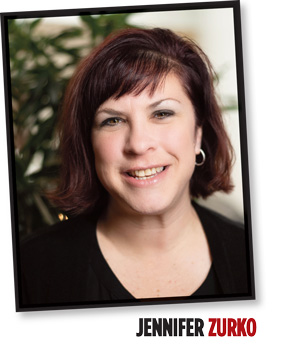11/1/2024
At Capacity
Jennifer Zurko

Every Saturday, I get The New York Times’ newsletter called “The Morning.” It doesn’t have as much hard news as their weekly newsletters, so it’s a nice change from politics, natural disasters and turmoil in the Middle East. The Morning focuses more on culture and hobbies, like cooking, movies, television, music and books.
A couple of months ago, NYT editor Melissa Kirsch asked in the newsletter: “If we can’t remember the things we’ve read and watched and even loved, do they still ‘count’?”
She said that everyone she knows seems to be talking about how their memory isn’t what it used to be and, boy, can I relate. This exact thing has been on my mind lately because I think my mind is showing its middle age.
I laughed when she wrote that her memory used to be so good she would have to hide it so she didn’t freak people out because that’s me. My friends and co-workers still comment that they can’t believe how much I remember. And when you have a drum-tight memory, people think you’re some sort of stalker.
But, recently, she said she’s re-watching shows she remembered liking, but can’t for the life of her recall the plot. When the NYT published the 100 best books of the century, she was glad she read so many that were on the list, but couldn’t write a decent book report on any of them now if she tried.
Melissa admitted it’s probably age. She also blamed COVID quarantine and stress for her dulling memory, which is why her friend suggested that maybe she’s in her “butter knife era” because she’s not as sharp as she used to be. But she said the most likely metaphor is that of a computer: her hard drive is just full.
“I’m reading and watching and listening to so much content—in addition to living life and having actual experiences, never mind daydreams and nightmares and extended reveries—that it seems I’m running out of disk space,” Melissa wrote. “I can’t count on things to auto-save anymore.”
And since you can’t selectively delete stuff in your brain like you would an actual hard drive, she has a copious amount of notes and to-do lists.
I can tell you that I never had to write anything down or keep to-do lists; now they’re an everyday occurrence. I have come to accept that for the rest of my life I will be dealing with my at-capacity mental hard drive.
Which is why I like to think that you use the information that we provide you—whether it’s in these pages, through our newsletters, our videos, our podcasts and webinars—as reminders for the stuff you weren’t able to save on your own mental hard drive. You’ve got a lot going on! You’re running a business and trying to produce a living product and managing staff and dealing with customers—not to mention you have a personal life, too. I would think most of you are at capacity or reached it a while ago. So our job is to help make sure you’re still staying up on the latest production research.
This month’s cover story gives a high-level look at using PGRs in young plant production, with Dr. Chris Currey including his own research and information based off of his session from the Plug & Cutting Conference. And there’s more PGR info on preventing lower leaf yellowing on geraniums from Dr. Roberto Lopez.
We also have good reminders on how to sanitize and disinfect your greenhouse between crop seasons, the basics of plant physiology (in case you don’t remember from Hort 101) and why you should know them, and using rooting hormones and stimulants during sticking.
A memory researcher Melissa quoted in her article said that I shouldn’t feel bad about my decreasing ability to recall things because our expectations of how much we think we should be able to remember doesn’t jive with how the human brain actually works. As you get older and experience more things and take in more information, you’re gonna forget stuff. It’s just the way it is.
And it’s nice to know I’m not the only one struggling with an overflowing brain. As Melissa wrote in her piece, “… there’s comfort in commiseration.” GT